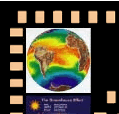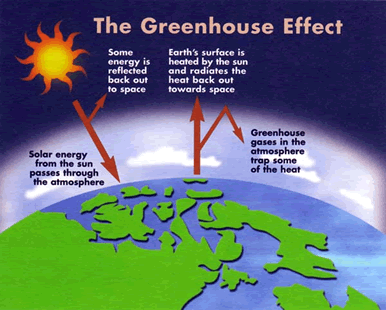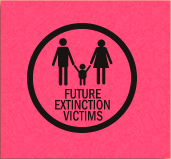







As a result, our climate is starting to change.
Climate change is a reality. Today, our world is hotter than it has been in two thousand years. By the end of the century, if current trends continue, the global temperature will likely climb higher than at any time in the past two million years.
There is a broad scientific consensus that that there will be a gradual increase in global temperatures by between 1.4 and 5.8 degrees by the end of the century and that humanity is in large part responsible for this change.
This will have serious implications for ecosystems, growing seasons, animals and their habitats. There may also be more intense and frequent extreme weather events.
The choices we make today will decide the climate of the future.

The Earth is warming faster than at any time in the past 10,000 years (IPCC).
The burning of coal, oil and gas has increased the amount of CO2 in the atmosphere by 30% over natural levels (IPCC).
By 2100 the world could be 6ºC hotter (IPCC) - recent research (e.g. at Oxford Univ.) suggests it could even be as much as 10ºC warmer on average.
The summer of 2003 was Europe’s hottest for 500 years. The heatwave caused 28,000 premature deaths across the continent.
Europe’s capitals have warmed, some by 2°C in the last 30 years. London’s average maximum summer temperature increased the most. This warming trend will increase the likelihood of more frequent and intense heatwaves, droughts and rainstorms (WWF-UK).
For more than a century, people have relied on fossil fuels such as oil, coal and gas for their energy needs. Burning these fossil fuels releases the global warming gas carbon dioxide into the atmosphere.
Other, even more potent, greenhouse gasses are also playing a role, as is massive deforestation.
Human activity has changed the levels of greenhouse gases in the atmosphere:
> by releasing carbon trapped in fossil fuels, such as coal, gas and oil, when they are burned for energy, heat or transport
> by chopping down trees to clear land for agriculture
In the UK:
* 40 per cent of our carbon emissions come from business activity
* 29 per cent are from transport
* 25 per cent are from homes
The biggest sources of carbon emissions for most people are likely to be:
* the energy you use in your home (heating is the biggest use)
* driving
* air travel
Other things in our homes contribute to climate change indirectly. Everything from food to clothes, and computers to carpets uses energy when it is produced and transported, causing carbon emissions to be released.
still warm in years to come as there is a time lag between when emissions occur and when their effects are felt.
150,000 people already die every year from climate change (World Health
Organisation).
In the next 15 years, displacement, disruption to agriculture and food supplies, and damage and destruction to infrastructure would be likely to lead to economic and
political instability, both within countries and across international borders, and even to wars as environmental refugees seek new homes and countries clash over scarce
water and food supplies. The industrial countries also could find themselves under immense pressure from huge numbers of environmental refugees from the developing world (Christian Aid).
100 million more people will be flooded by end of century (FoE).
30 million more people may be hungry because of climate change by 2050 (Hadley Centre, UK).
By the end of the century, rising sea levels and crop failures could create 150 million refugees. Even in the UK, 5 million people are at risk from increased flood and storm damage (Operation Noah).
Poorer countries worst affected
People in low-income countries are four times more likely to die in natural disasters
than people in high income countries. Globally, disaster losses increased from $71 billion in the 1960s to $608 billion in 1990s. Poverty and lagging development exacerbates people’s vulnerability to extreme weather (Oxfam).
The area of the world stricken by drought has doubled between 1970 and the early
2000s (Greenpeace).
Rainfall
Some regions will experience more extreme rainfall while others will experience
drought.
The financial costs of flooding could rise in both the UK and the rest of Europe,
increasing the annual flood bill by up to £82 billion across Europe. (Association
of British Insurers).
Rising sea levels
These could rise by more than 40 cm by the end of the century. As the oceans warm,
the water expands and more water melts from glaciers and polar ice caps. The new levels would swamp small low-lying island states and put millions of people at risk
of flooding.
There has been a 40% drop in the amount of arctic ice since the 1970s. Were this
effect to spread, and the northern ice fields melt, a rise in sea levels of up to seven
meters would occur. This would not simply overwhelm low-lying countries like Bangladesh, but also major western cities such as London, Rome and New York
(People & Planet).
The whole western Siberian sub-Arctic region has started to thaw for the first time
since its formation, 11,000 years ago. The area, which is the size of France and
Germany combined, could release billions of tones of greenhouse gases into the atmosphere. This would be irreversible and would ramp up temperatures even
more (BBC).
Polar bears could become extinct by the end of this century. They are very unlikely to survive as a species if there is an almost complete loss of summer sea ice cover,
which is projected to occur before the end of this century by some climate models
(WWF-UK).
Water
There will be less water available for irrigation and drinking because there will be less rain. Up to three billion more people could suffer water shortages by 2080 in northern Africa, the Middle East and the Indian sub-continent.
Harvest
Cereals and crop yields are expected to suffer in areas of less water and increased temperatures.
In one region of Mozambique, it used to be normal with two seasons – hot and cool. Recently temperatures have risen from 30°C up to 49°C in the hot season and are
less cold in the cool season, changing the timing of the rains. The majority of communities are afraid to plant, thinking that it is not the right time, thus affecting the
food security of the region (Tearfund).
Disease
Malaria, West Nile fever, dengue fever and river blindness will spread to a wider area
with an extra 290m people exposed to malaria by the 2080s.
Wildlife
If temperatures rise in the middle of the predicted range, a third of all land-living
species will be threatened by 2050. Some species are unable to adapt quickly
enough to the temperature change and habitats might not be available for them
to move into.
Up to a third of land-based species could face extinction by the middle of the century (RSPB).
Rainforests
Higher temperatures and reduced rainfall could mean the loss of large areas of the Brazilian and southern African rainforest.
Gigantic economic costs
The economic costs of global warming are doubling every decade (UN).
The cost of insured damage in a severe hurricane season in the USA could rise by three-quarters to £82billion ($ 150 billion), an increase equivalent to almost three Hurricane Andrews - the costliest single weather event recorded” (Association of British Insurers).
Without urgent action, climate change will devastate life on earth. Hundreds of millions of people, particularly the world’s poorest and most vulnerable, will be put at severe risk of drought, floods, starvation, and disease.
If we are to avoid catastrophic climate change, we need to cut our emissions of greenhouse gases, and keep the average global temperature increase under 2°C.
Capping the rise in average global temperatures doesn’t mean that we won’t see any harmful impacts, but a 2°C limit will keep them to a minimum. To stay within this limit, global greenhouse gas emissions must peak and be falling irreversibly by 2015.
Therefore the choices made now and in the next five to ten years, by politicians and decision makers, will determine the extent of the devastation faced by future generations.
So far, politicians have failed to take sufficient action to avoid exceeding this 2°C limit.
Legally binding national targets for reducing greenhouse gas emissions are the only way of meeting the global 2015 target, as well as holding world leaders to account over taking the necessary action.
The alternative to legally binding targets is voluntary schemes. However, it is widely accepted that voluntary schemes cannot achieve the same level of environmental protection as mandatory ones; they are usually adopted when political resistance blocks the implementation of more powerful mandatory controls.
It is not wise to risk leaving the issue of greenhouse gas emissions to voluntary action; the problem requires legally binding targets that are set by the scientific analysis, and not weakened by political considerations.
High emitting countries, with their prime historic responsibility for the emissions that have led to this crisis, must lead in reducing their emissions to make certain that this goal is achieved.
Developing countries must also ensure that their own emissions are ultimately reduced within a global framework, but by an amount and timing that accounts for their pressing developmental needs and lack of resources.
At Individual Level
To reduce the risk of radical changes to temperatures in the future, action is needed now. The government in the UK is working internationally to gain agreement to reduce greenhouse gas emissions across the world.
It has set targets for cutting carbon emissions and is ahead of its international obligations on greenhouse gases. But to meet its target for cutting carbon dioxide emissions by 60 per cent by 2050, everyone must act together - government, businesses and individuals.
read a more detailed description and browse through many more tips go
to our top green tips page.
1 Get informed and get involved. Read books and newspapers and watch films and
DVDs about global warming. Get to know some facts so you can rebutt climate change deniers! Then talk to your neighbours, co-workers, friends, family and community
groups about ways to reduce global warming.
2 Fly less. Business travelers can take advantage of great new technologies such as video conferencing and webcasting.
Explore new areas close to home for your next vacation.
3 Take public transport or walk, bike & car pool. Consider moving to a location where taking transit and walking are an easy alternative to driving to work.
4 Take care of your trash. Composting all organic waste – and recycling paper,
cardboard, cans and bottles – will help reduce the greenhouse gas emissions associated with landfills.
5 Create an energy efficient home. Look for the “EnergyStar” label when purchasing
new appliances, and replace incandescent light bulbs with compact fluorescent light bulbs. Remember to switch off lights when you leave a room, and unplug all
appliances that are not being used.
6 Purchase your electricity from sustainable energy sources. There are plenty of options around now so don't be lazy and switch straight away.
7 Get your home an energy audit. Many communities now have local groups that will come into your home and give you an energy audit. Some grants are available for insulating your home.
8 Eat wisely. Choose foods that are local, organic and low on the food chain
whenever possible. Make the most of seasonal foods and decrease your intake of
meat.
9 If you buy a car, make fuel efficiency a top priority. Think about the day ahead and
plan your trips so that you run as many errands as you can at once.
10 Calculate your carbon footprint and aim to go as carbon neutral as possible!
"Climate change is a far greater threat to the world than international terrorism"
(Sir David King, UK Government's chief scientific adviser).
“Imagine melting polar icecaps and rising sea levels, threatening highly developed coastal areas...Imagine a warmer and wetter world in which infectious diseases such
as malaria and yellow fever spread more easily…(this is not) science fiction; it is
sober prediction, based on the best science available” (UN Secretary General,
Kofi Annan).
"A path to prosperity that ravages the environment and leaves a majority of humankind behind in squalor will soon prove to be a dead-end road for everyone" (UN Secretary, General Kofi Annan).
"The key is actually discarding the idea that has dominated economic policy making, which is: in order for a country to get rich, stay rich and get richer, you have to put more greenhouse gases in the atmosphere. That isn't true and it hasn't been true for years" (Former US President Bill Clinton).
"This is a huge problem. If we don't deal with this within just a few years, you will have island nations flooded; you will have the agricultural balance of most countries
completely changed; you will have a dramatic increase in the number of severe, unmanageable weather events... The good news is that we can now deal with this problem - and strengthen our economic growth, not weaken it" (Former US
President Bill Clinton).
“It is not sufficient to have debt cancellation, aid raised to 0.7% of GDP and fair trade if
you also have global warming and environmental degradation...we have to mobilise
to make sure climate change is on the same frontburner in people's minds as the
other issues" (Mary Robinson, former UN High Commissioner for Human Rights).
“The environment is very important in the aspects of peace because when we destroy our resources and our resources become scarce, we fight over that” (Wangari Maathai, Nobel Laureate).













